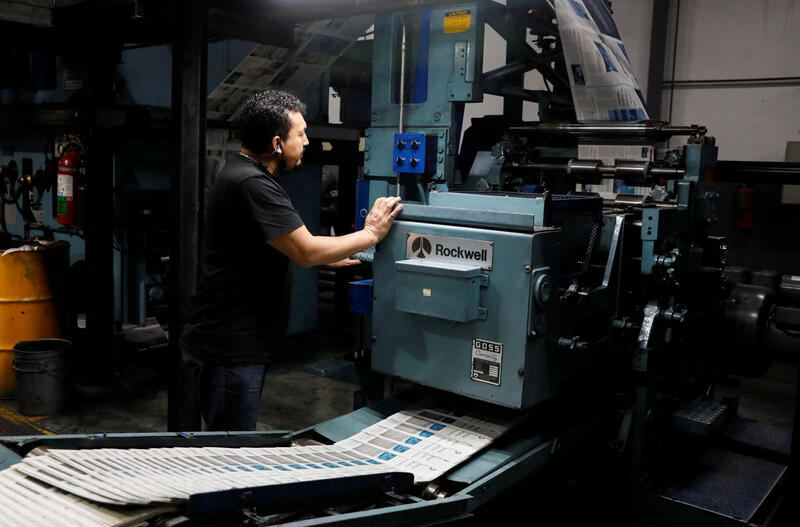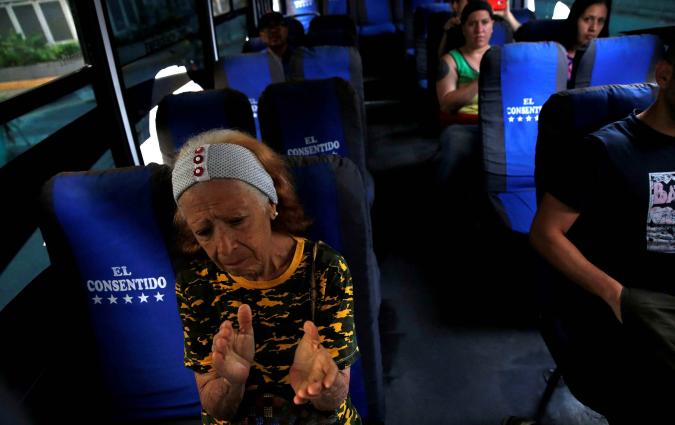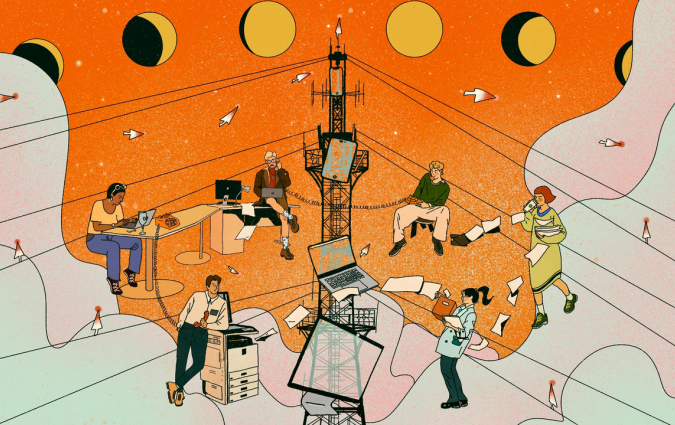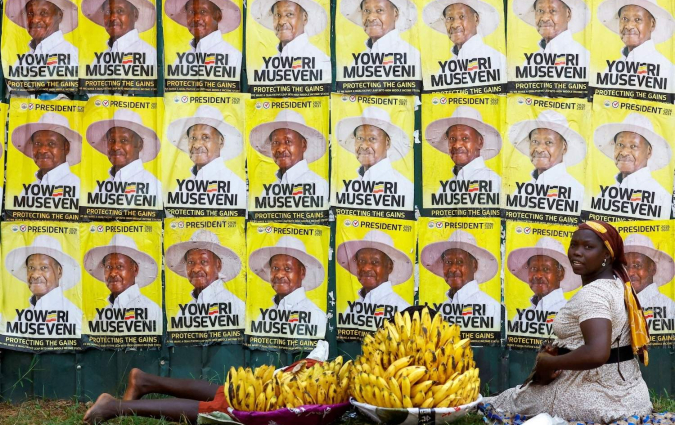Meet the journalists defying a widening crackdown on press freedom in Guatemala

An employee prints copies at the facilities of Guatemalan newspaper 'elPeriodico' in August 2022. REUTERS/Luis Echeverría
Twenty-seven years after its launch, Guatemalan newspaper elPeriódico published its last edition on 15 May. Its last front page depicts a person entering a large dark maze with the words #DecimosNOalPoder (“We say NO to power”).
A few days before, the newspaper explained it had been worn down by government pressures. Its founder José Rúben Zamora has been in jail since July 2022 under unsubstantiated charges of alleged money laundering, blackmail and influence peddling. Nine of the journalists of the newspaper are under investigation and four of its lawyers have been arrested, with two still in jail.
In his latest column from prison, Zamora writes that he will continue to stand for press freedom in the country. “Despite the fatigue, the severe adverse conditions, the humiliation and the derision, I will not cease in my fight for freedom and democracy in Guatemala. Without press freedom, there is no democracy," he writes.
Guatemala has experienced a gradual decline of press freedom since Alejandro Giammattei became President in 2020. Before his election, the country stood at 116 in the RSF's World Press Freedom Index. Three years later, Guatemala has fallen to the 127th spot. Since taking office, Giammattei has displayed a hostile attitude towards the media. According to the Journalists Association of Guatemala, more than 380 attacks against journalists and their work have been recorded in the country between 2020 and 2022.
Journalists in the country have also been drowned in lawsuits ranging from cases of defamation to psychological violence against women. With Guatemala’s freedom of the press taking a nosedive and after the elPeriódico’s shutdown, I spoke to four Guatemalan journalists still standing for press freedom in the country.
A void left behind
The closure of elPeriódico was a death foretold. Since Zamora was arrested, the newspaper was struggling with increased pressures from the government, and this forced the newspaper to halt its print edition in November 2022. In a statement explaining the decision, the editorial board said that it was due to “repression, intimidation, expansion of the commercial boycott, illegal raids, arrests and team members in custody or forced to leave the country in recent weeks due to the current context of our country.”
The last months of elPeriódico were marked by difficulty but hope, said a journalist who worked at the newspaper and who has requested to remain anonymous as it’s one of the journalists investigated by the government. “These last months were complicated but we kept on going,” he says.
“It feels like a vacuum,” the journalist says. “We are losing a news organisation that was very important in Guatemala. It was a pioneer in investigative journalism. When nobody was doing investigative journalism, the newspaper was doing it and that set the opening for other outlets to follow that line.”
Fighting the good fight
Those remaining independent news organisations are now concerned about the precedent that the trial against Zamora is setting and mourn the loss of one of Guatemala’s beacons of independent press.
Nelton Rivera is the founder of Prensa Comunitaria Km 169, a news agency in Guatemala with a community and multidisciplinary approach funded by philanthropic and international foundations. The newsroom employs over 20 people and works with 40 contributors nationwide, most of them from indigenous communities.
Rivera says the arrest of Zamora and the closure of elPeriódico represent a regression to authoritarianism in the country. “It is the use of the justice system to create express cases, to punish, to imprison, to criminally prosecute and it is an exemplary punishment,” he says. “What they are trying to show us is that not if we don’t align with the regime we are going to go through the same things this newspaper is going through.”
Alejandra Gutiérrez Valdizán is the editor of investigative outlet Agencia Ocote, a newsroom of around a dozen journalists funded with the support of NGOs and foundations. She describes the current period as part of an “authoritarian wave” in the region. “The feeling when talking to colleagues and editors of other media outlets is helplessness, defeat, and a lot of frustration,” she says. “There is also a feeling of great fear and instability because in some way elPeriódico represented a lot symbolically.”
Francisco Rodríguez is editor of news site Plaza Pública, a newsroom of also around a dozen journalists mostly funded by the Universidad Rafael Landívar. Francisco says that the case against Zamora goes beyond Zamora himself and his newspaper. “During the hearings and during the trial, they have let it be known that they are targeting more journalists and more media outlets,” he says. “They say that there is no such control of free speech, but there is. They are sending a message and they know what the impact is.”
Not just a single case
The case against Zamora is not the first instance of a journalist detained in the country during the Giammattei government.
In September 2020, Guatemalan police arrested journalist Anastasia Mejía on criminal charges, including sedition and arson, connected to her coverage of a demonstration against the mayor of Joyabaj, town in Guatemala with a population of around 80,000. She was held in pretrial detention for five weeks before being released on house arrest. Criminal charges were dropped a year after the arrest.
Journalist Robinson Ortega was arrested in June 2022 while covering a demonstration against the Municipality of Siquinalá. According to local reporting, Ortega was taken to court after documenting an abuse of authority by agents against a group of women. His charges were dropped a few days later.
Again in 2022, journalist Carlos Choc faced criminal charges based on a complaint from 13 police officers who accused the journalist of “instigation to commit a crime” after he reported on a demonstration against mining activities in October 2021. He was exonerated from all charges a year later. In 2022, criminal charges related to corruption against journalist Juan Luis Font forced the journalist to leave the country in exile.
“They are using the law to validate a decision already made,” says Rodríguez. The use of the law as a weapon against journalism is a phenomenon that has become more common and complex: journalists are no longer just being arrested for defamation suits, but the whole gamut of the law is being used to silence them.
In Guatemala, for example, criminal lawsuits have been filed against journalists accused of committing psychological violence against women under the Law Against Femicide. “What we are seeing is the ultimate representation of a co-opted state and a co-opted justice system punishing Guatemalan journalism, especially independent journalism,” says Rivera.
Keeping journalism alive
Gutiérrez Valdizán says the current environment for journalists is “a brutal setback”. Government officials refuse to make themselves available for interviews or don’t allow journalists to ask questions at press conferences. “This backwardness, this crushing, this imposition of fear had never been experienced before,” she says. “We see direct strategies for discrediting and criminalising journalists.”
This criminalisation has made sources afraid to speak to the media. Since the beginning of Giammattei's administration in 2020, more than 30 justice operators, lawyers, journalists and human rights activists have left the country due to alleged persecution against them.
The journalists of Prensa Comunitaria have already experienced a number of difficulties while reporting on indigenous and environmental issues. Since the outlet started 12 years ago, Rivera says he has seen journalists being insulted on social media and criminalised for doing their job. He also says that the transnational companies they report on have managed to co-opt local members of the judiciary.
Rivera says that they established a relationship with the prosecutor's office when their journalists were taken to court. But the scale of the attacks they have seen in the most recent years is unprecedented and concerning. “Now we are dealing with something that’s much bigger,” he says.
Another threat to independent journalism in the country is its funding. A 2021 law that seeks to regulate NGOs in the country allows the government to deregister any non-governmental organisation that has “violated the public order,” and requires organisations to disclose all foreign funding. This law, which has been adopted in different forms by other authoritarian countries like Nicaragua, allows governments to monitor the finances of independent news organisations supported by foreign benefactors.
“Non-commercial or independent media are under the NGO law for being an association,” says Gutiérrez Valdizán. “So you have to deliver an unimaginable amount of paperwork and you have to have a person in charge of giving information: these bureaucratic issues have tripled.” She explains that while they try to depend less on foreign funds, the economic situation in the country forces them to depend on international funds: “The law on NGOs affects us in the sense that they ask for a huge amount of documentation, paperwork and reports, which causes an enormous investment of time for the administrative team.”
Nicaragua has sentenced a newspaper publisher for money laundering charges and has driven journalists and civil society members to exile, with virtually no independent outlets operating from inside the country. Many in Guatemala are concerned about their country following the playbook of their neighbour. “What we are seeing today is the replica of Nicaragua, but at a much faster pace,” Rivera says.
A respite in regime change?
The closure of elPeriódico is taking place against the backdrop of an upcoming election on 25 June. While President Giammattei is barred from running for reelection, journalists are concerned about the integrity of the election and about the future of press freedoms in the country. Guatemala’s election authority has barred a number of candidates from running in the 2023 presidential elections on “dubious grounds” according to Human Rights Watch.
The upcoming elections are yet to provide a respite for those that continue standing for press freedom in the country. All the journalists I spoke to see the current electoral race as a continuation of the current system. “It is the continuity of the same model,” says Rivera from Prensa Comunitaria. “We do not see a candidacy that could represent a break with this alliance.”
The alliance that Rivera refers to is what many in the country call the ‘Pacto de Corruptos’ or ‘corrupt pact’: an agreement between businessmen, politicians and the military to stop or reverse the investigations against them.
My sources say that all of the candidates running for the presidency represent a continuation of the system that has vilified the media. Two of the frontrunner candidates, Zury Ríos and Sandra Torres, are family members of former Presidents. Notably, Ríos is the daughter of former dictator Efraín Ríos Montt, whose tenure saw one of the bloodiest periods in the 36-year Guatemalan Civil War. Torres, on the other hand, is a former First Lady of Guatemala.
Even political newcomers like presidential candidate Carlos Pineda, who’s leading some of the polls, wouldn’t change anything as he would arrive in power without a party behind him, meaning that Congress would likely create a political stalemate. Pineda’s candidacy is at risk due to an alleged series of irregularities when the party presented its candidates.
“I still see the future looking a little bleak for Guatemala,” says the journalist from elPeriódico I spoke to. “I even think that press freedom in Guatemala could get worse depending on who wins this election.”
Building alliances
While the future looks challenging, Rodríguez from Plaza Pública says that he has never seen as much solidarity amongst media organisations. “There is a trace of hope in solidarity,” he says. “In other words, we also understood the lessons from Nicaragua and El Salvador and we are trying to build alliances and help each other.”
One of the fruits of those alliances is Guatemala Leaks, an independent and secure platform to confidentially share information of public interest which was created by Guatemalan media outlets. Investigations based on leaks are defined by a board of editors (one for each of the five media outlets) and a team is created to prepare the story, with an editor and one or two reporters.
Another project is called La Linterna, a fact-checking collaborative project against disinformation in the upcoming general elections. Five outlets are involved in the project which, in addition to doing fact-checking, they also verify candidate’s speeches as well as detect hoaxes.
Perhaps the most important joint initiative is “No Nos Callarán” (In English: They will not shut us up), an alliance of Guatemalan media created to protest against the judicial persecution of elPeriódico colleagues and to resist the overall persecution against the press in the country.
“These alliances are very important,” says Gutiérrez Valdizán. “[But] I also believe it’s important to build alliances with citizens. One of the sad things for me is that this whole debacle is happening and citizens do not know much about it, because it seems to be alien to them.”
“I hope that elPeriodico can relaunch in the future. Independent media are important for democracy. Without them, we would be living in a tyranny,” the journalist who worked for elPeriódico told me.
Despite this grim landscape, none of the journalists I spoke to are thinking about leaving the profession. “There is a decision by journalists to continue doing the job,” says Rivera. “They know the reality. They know how adverse the model of the system is and how unfair it can be many times. But there is a conviction to continue doing the job.”
In every email we send you'll find original reporting, evidence-based insights, online seminars and readings curated from 100s of sources - all in 5 minutes.
- Twice a week
- More than 20,000 people receive it
- Unsubscribe any time







